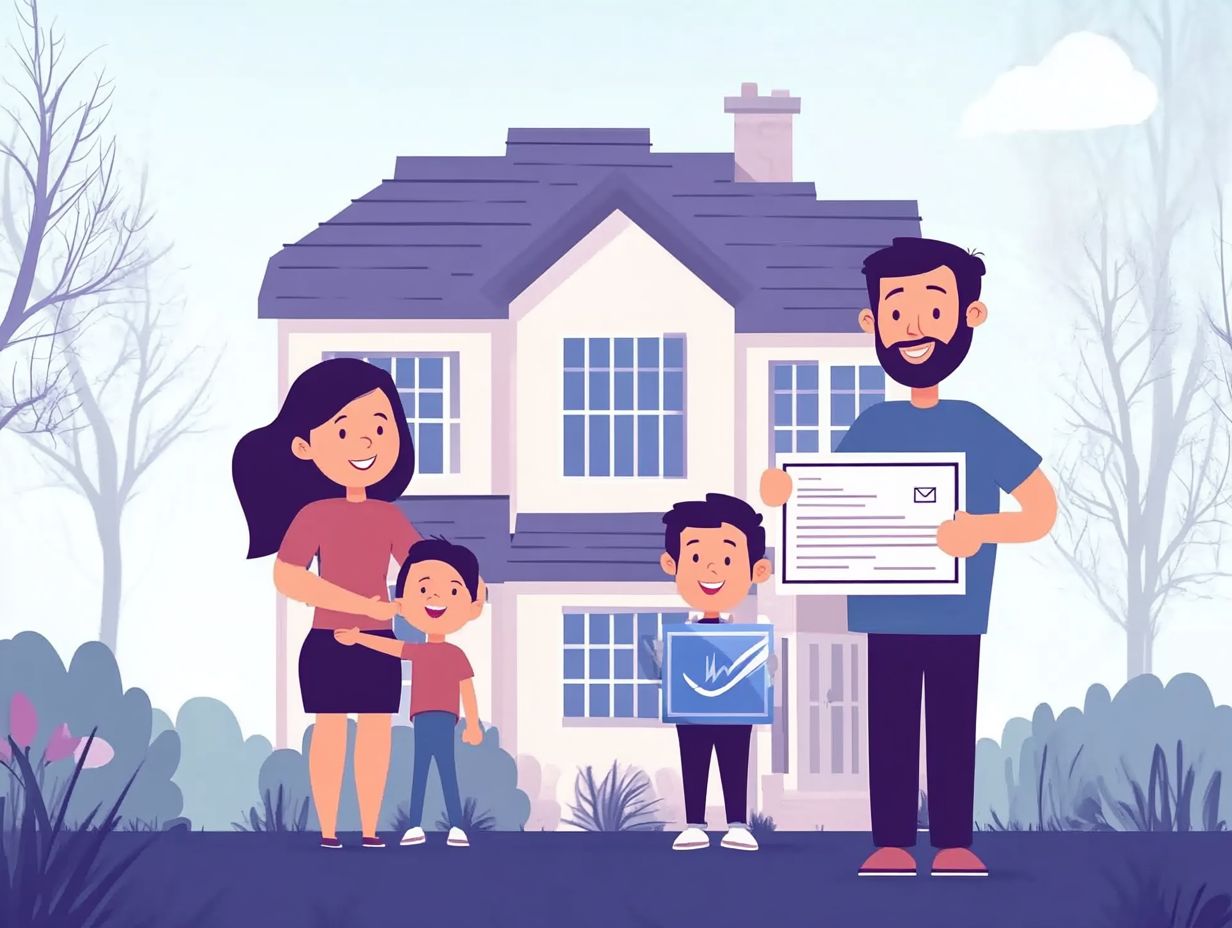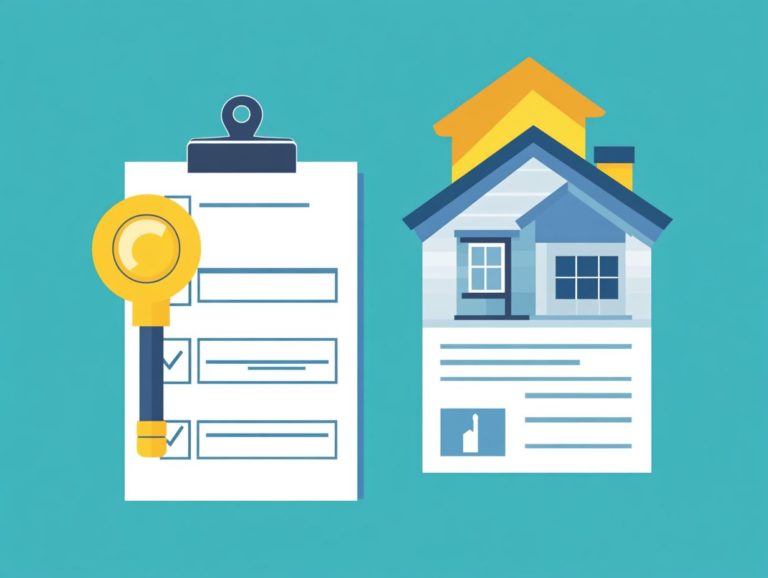The Importance of Homeowner’s Insurance in Mortgages
Homeowner’s insurance is not merely a safety net; it serves as a vital pillar of homeownership, particularly for those securing mortgages. This article delves into homeowner’s insurance, shedding light on what it entails, why it s essential for safeguarding both lenders and homeowners, and the different types of coverage available.
It also addresses the factors that influence insurance costs, offers tips for selecting the right policy, and presents strategies to save money while ensuring you have adequate protection. Grasping these elements can empower you to make informed decisions about your home insurance needs.
Contents
- Key Takeaways:
- Understanding Homeowner’s Insurance
- Why Homeowner’s Insurance is Necessary for Mortgages
- Types of Coverage in Homeowner’s Insurance
- Factors that Affect the Cost of Homeowner’s Insurance
- How to Choose the Right Homeowner’s Insurance
- Tips for Saving on Homeowner’s Insurance
- Preguntas Frecuentes
- Qu es el seguro de hogar y por qu es importante en las hipotecas?
- C mo beneficia el seguro de hogar al propietario?
- Se requiere seguro de hogar para todas las hipotecas?
- Qu sucede si no tengo seguro de hogar?
- Puedo cambiar mi p liza de seguro de hogar durante el plazo de la hipoteca?
- Hay factores que pueden afectar el costo del seguro de hogar?
Key Takeaways:

- Homeowner’s insurance protects both the lender and homeowner in case of unexpected events such as natural disasters or accidents.
- It s necessary to secure a mortgage and ensure that the property and investment are protected.
- Key components of homeowner’s insurance include dwelling, personal property, and liability coverage, which should be carefully evaluated.
Understanding Homeowner’s Insurance
Understanding homeowner’s insurance is essential for you as a homeowner. It provides vital financial protection against the damages and liabilities that come with owning a home. This insurance is designed to protect your investment, ensuring that you meet both lender requirements and your personal financial obligations.
Homeowner’s insurance offers a range of coverage options tailored to your unique needs, effectively mitigating risks associated with unforeseen hazards. It not only shields the physical structure of your home but also encompasses your personal belongings, fostering a secure experience in homeownership.
What is Homeowner’s Insurance?
Homeowner’s insurance is a tailored policy designed to protect you from the risks of property ownership. This vital coverage acts as a guardian for your home’s physical structure, often referred to as dwelling coverage. It covers damages from unfortunate events like fire, theft, or harsh weather.
The policy typically includes liability coverage, which provides financial protection if someone is injured on your property or if you inadvertently cause damage to someone else’s belongings. Personal property coverage ensures that your cherished items furniture, electronics, and little treasures are protected against theft or damage.
By weaving together these various protections, homeowner’s insurance becomes an essential safety net for anyone investing in real estate, helping to lighten the financial load that unexpected events can impose.
Why Homeowner’s Insurance is Necessary for Mortgages
Homeowner’s insurance is vital for securing your mortgage, acting as a shield for both you and your lender against unexpected financial setbacks. It ensures that your property is well-protected from potential risks.
Mortgage lenders require borrowers to obtain this type of insurance to mitigate risks associated with property damage and liabilities that could impact repayment. By securing a comprehensive insurance policy, you meet the lender’s requirements and safeguard your investment.
This proactive approach allows you to navigate the financial responsibilities of homeownership with confidence. Wouldn t it be great to have peace of mind knowing your home is protected?
Protecting the Lender and Homeowner
Homeowner’s insurance is essential for protecting both mortgage lenders and homeowners against financial risks. It ensures that your investment in property is secured from potential damages.
This type of insurance acts as a vital risk management tool, safeguarding your assets while mitigating potential losses for lenders in unforeseen circumstances. Without this coverage, you could face crippling repair costs from incidents like fire or severe weather, leading to serious financial strain or even bankruptcy.
Legal troubles may arise if someone is injured on your property, leaving you exposed without liability protection. A comprehensive policy can cover natural disasters, theft, and personal liability, providing you with peace of mind as you invest in your home.
Types of Coverage in Homeowner’s Insurance

Homeowner’s insurance offers a comprehensive suite of coverages tailored to safeguard you against the myriad risks tied to property ownership. This includes dwelling coverage, which protects the structure of your home; personal property coverage, safeguarding your belongings; and liability coverage, providing financial protection in case of accidents that occur on your property.
Dwelling Coverage
Dwelling coverage is vital for protecting your home s physical structure against certain hazards. It covers the main dwelling and attached structures like garages and decks, safeguarding you from unexpected events like fire or vandalism.
Be aware of the policy limits and what s not covered, as certain natural disasters may not be included in standard policies. Determine the appropriate coverage amount by assessing the replacement cost of your home and considering local building codes that might necessitate upgrades after a loss.
By evaluating these factors, you can tailor your coverage to align with your financial needs and potential risks.
Personal Property Coverage
Personal property coverage within your homeowner’s insurance serves as a shield for your belongings think furniture, electronics, and clothing against risks like theft and damage.
This type of insurance typically evaluates the value of your items based on their market price, so keep an accurate inventory of your possessions. Proper documentation, including receipts and photographs, is essential for ensuring a smooth claims process.
It s crucial to recognize that coverage often comes with specific limits and what s not covered, meaning not everything you own is equally protected. If you possess high-value items, such as jewelry or fine art, consider additional options, like floaters, to ensure adequate protection against potential loss.
Liability Coverage
Liability coverage is a cornerstone of homeowners insurance, shielding you from legal and financial responsibilities stemming from injuries or damages that occur on your property.
This insurance is critical for unexpected accidents, like a guest slipping on a wet floor or a neighbor s child getting hurt while playing in your yard. Such incidents could result in steep medical bills or legal fees if a lawsuit arises.
It s essential to grasp the limits and what s not covered; for instance, injuries from intentional actions or business-related activities on your property are typically excluded. Having solid liability coverage gives you peace of mind, allowing you to enjoy your property without the anxiety of potential claims or lawsuits that could threaten your financial stability.
Factors that Affect the Cost of Homeowner’s Insurance
Several factors will influence the cost of your homeowner’s insurance, including your location, the value of your property, your claims history, and your credit score. Each of these elements plays a significant role in determining your premium rates.
Location and Property Value

The location and property value of your home significantly impact your homeowners insurance premiums. Certain geographical areas present higher risks and, consequently, higher costs.
If your home is in a region prone to natural disasters like hurricanes or floods, you re likely to face steeper insurance rates compared to those in more stable climates. Urban neighborhoods with elevated crime rates can also lead to increased premiums due to higher chances of theft or vandalism.
The value of your property is crucial more valuable homes typically require greater protection, translating into higher insurance expectations. Assess your local environment and associated risks when selecting your insurance coverage to ensure adequate protection tailored to your specific needs.
Claims History and Credit Score
A homeowner’s claims history and credit score are key factors that insurance providers consider when setting premium rates for homeowners insurance.
Frequent claims can lead to higher premiums because insurers view this as an increased risk. A low credit score may also suggest financial instability, making insurers see you as less reliable.
To manage these elements effectively, consider strategies to improve your credit score, such as:
- Making timely payments
- Reducing debt
- Monitoring credit reports for errors
Be careful with claims. Cover minor damages out-of-pocket when possible to lower your risk profile. This can ultimately lead to more affordable insurance premiums.
How to Choose the Right Homeowner’s Insurance
Selecting the ideal homeowner’s insurance involves carefully looking at different coverage choices while understanding your unique needs and financial situation.
It’s essential to navigate this process thoughtfully to ensure your choice aligns perfectly with your personal circumstances.
Evaluating Coverage and Cost
It’s vital for homeowners to evaluate coverage and cost to select an insurance policy that meets their unique needs while staying within budget.
Consider the various types of coverage available. Compare policy limits the most your insurance will pay out with the deductibles, which is the amount you ll need to pay out-of-pocket before your insurance kicks in.
Understanding what is included in each policy can highlight the essential features versus optional add-ons. This knowledge influences both the comprehensiveness of your coverage and the overall cost.
By analyzing these aspects, you can make informed choices that align with your preferences and financial situation, leading to a more secure and satisfactory insurance experience.
Tips for Saving on Homeowner’s Insurance
Discover exciting ways to save on your homeowner’s insurance premiums!
Consider bundling your policies for added savings. Don t overlook the impact of thoughtful home improvements.
Bundling Policies and Making Home Improvements

Bundling your homeowners insurance with other policies, like auto insurance, can lead to significant savings on premiums. Making strategic home improvements can further reduce those costs.
By consolidating your various insurance policies, you not only enjoy a more streamlined experience but also benefit from lower overall rates.
Certain home upgrades, such as installing security systems, upgrading roofs, or investing in energy-efficient windows, can qualify you for discounts, amplifying your savings.
These enhancements protect your property and signal to insurers that your home poses a lower risk, resulting in more favorable premium rates.
By proactively bundling insurance and investing in renovations, you can significantly lighten your financial burden and enjoy the peace of mind that comes with it.
Preguntas Frecuentes
Qu es el seguro de hogar y por qu es importante en las hipotecas?
El seguro de hogar es un tipo de seguro que protege al propietario de p rdidas financieras en caso de da o o destrucci n de su hogar. Es importante en las hipotecas porque proporciona una red de seguridad para el prestamista si el prestatario no puede hacer los pagos por circunstancias inesperadas.
C mo beneficia el seguro de hogar al propietario?
El seguro de hogar no solo protege al prestamista, sino tambi n al propietario en caso de da o o p rdida a su propiedad. Cubre el costo de reparar o reconstruir la casa, as como cualquier pertenencia personal da ada. Tambi n proporciona cobertura de responsabilidad si alguien resulta herido en la propiedad.
Se requiere seguro de hogar para todas las hipotecas?
En la mayor a de los casos, se requiere seguro de hogar para todas las hipotecas. Los prestamistas quieren asegurarse de que su inversi n est protegida y generalmente exigen que los prestatarios tengan una cierta cantidad de cobertura. Sin embargo, los requisitos espec ficos pueden variar seg n el prestamista y el tipo de hipoteca.
Qu sucede si no tengo seguro de hogar?
Si no tienes un seguro de hogar, podr as poner en riesgo tu hipoteca. Si tu casa se da a o se destruye y no puedes hacer los pagos, el prestamista puede ejecutar la hipoteca.
Esto significa que perder as tu propiedad. Adem s, ser s responsable de cubrir cualquier costo de reparaci n o reemplazo de tu propio bolsillo.
Puedo cambiar mi p liza de seguro de hogar durante el plazo de la hipoteca?
S , puedes cambiar tu p liza de seguro de hogar en cualquier momento. Solo necesitas notificar a tu prestamista para asegurarte de que la nueva p liza cumpla con sus requisitos.
Revisar tu p liza regularmente es crucial. Esto te ayuda a hacer las actualizaciones necesarias y mantener una cobertura adecuada.
Hay factores que pueden afectar el costo del seguro de hogar?
S , varios factores pueden afectar el costo del seguro de hogar. La ubicaci n de la casa, la edad y el estado de la misma son importantes.
Adem s, tu puntaje de cr dito y tu historial de reclamaciones tambi n impactan el costo. Es vital conocer estos aspectos para obtener la mejor p liza posible.





